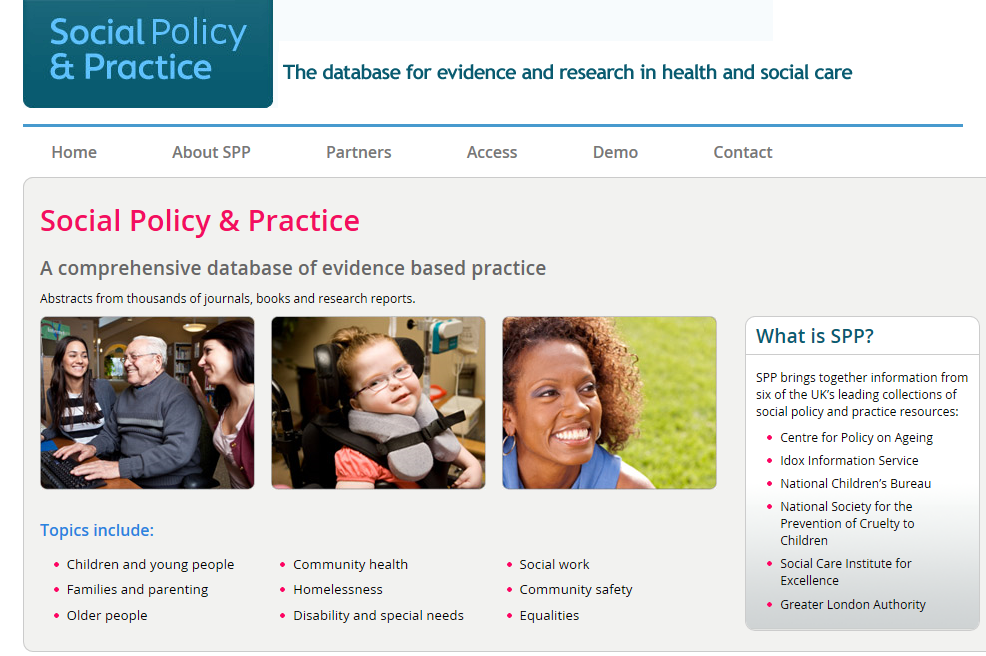 With public sector austerity and the integration of health and social care, it seems as though the need for access to evidence-based policy and practice has never been stronger. Initiatives such as those from the Alliance for Useful Evidence, most recently its practice guide to using research evidence, have highlighted the importance of using trusted sources rather than “haphazard online searches”. One of these resources is Social Policy and Practice, a database which we have contributed to for twelve years.
With public sector austerity and the integration of health and social care, it seems as though the need for access to evidence-based policy and practice has never been stronger. Initiatives such as those from the Alliance for Useful Evidence, most recently its practice guide to using research evidence, have highlighted the importance of using trusted sources rather than “haphazard online searches”. One of these resources is Social Policy and Practice, a database which we have contributed to for twelve years.
“SPP is useful for any professional working in the field of social care or social work who can’t get easy access to a university library.” Alliance for Useful Evidence, 2016
The journey to a new resource
A recent article in CILIP Update has explored the background to the Social Policy and Practice database, and its contribution to ensuring the inclusion of grey literature and a UK-perspective within systematic reviews. Update is the leading publication for the library, information and knowledge management community and they’ve given us permission to share this article with our blog readers.
We’ve written before about the value of UK-produced databases within a global publishing context. The CILIP Update article makes the point that when conducting any search for evidence, it’s important to look beyond the major databases to more specialist collections, to source grey literature and to look beyond geographical borders.
This was one of the major drivers in 2003, when the heads of the Centre for Policy on Ageing, the Greater London Authority, Idox Information Service, National Children’s Bureau and Social Care Institute for Excellence agreed to pool their resources and create the first national social science database embracing social care, social policy, social services, and public policy.
The proposal was met with great enthusiasm by the sector which recognised a gap in provision. The new Social Policy and Practice database was launched in November 2004.
The strengths of consortium working
Bringing together these organisations was relatively simple. They were all striving to provide evidence and information to their staff, members or customers. They all also had a professional drive to share their focused collections with the wider world of researchers and to influence policy and practice.
Through developing best practice and troubleshooting problems together, we have improved not only the Social Policy and Practice database for users but also improved our own individual collections. All whilst remaining independent and focused on our individual specialities.
Continuing to evolve
The NSPCC joined the database consortium in 2015, bringing its collection of resources focused on child abuse, child neglect and child protection. The NSPCC library is Europe’s largest collection of publications dedicated to safeguarding children. It includes journal articles, books, academic papers, leaflets, reports, audio-visual material, websites and digital media on all subjects that help researchers, policy makes and practitioners protect children from abuse and neglect.
Social Policy and Practice now boasts over 400,000 references to papers, books and reports and about 30% of the total content is grey literature. Social Policy and Practice has been identified by the National Institute for Health and Care Excellence (NICE) as a key resource for those involved in research into health and social care.
We’re proud to be contributing to the knowledge base for social research, policy and practice!
To find out more about Social Policy and Practice (SPP) database for evidence and research in health and social care, or to get a free trial, please visit www.spandp.net
Read some of our other blogs on evidence use in public policy:
- Q&A with Mark Evans, Professor of Governance at the Institute for Governance and Policy Analysis at the University of Canberra: “To make evidence effective you have to win the war of ideas”
- Who’s who in the UK’s evidence landscape
- How collecting evidence can help improve public policy: Scottish Enterprise’s approach to economic development evaluation
- Knowledge insider…. a Q & A with Jonathan Breckon, head of the Alliance for Useful Evidence
Share
Related Posts
Supporting residents on the decarbonisation journey: leveraging data for effective retrofit projects
As the drive towards decarbonisation intensifies, the social housing sector’s ability to collect, store and manage vast amounts of data becomes increasingly critical. With a shared goal of creating warmer, carbon-free homes, housing associations’ strategic use of data is essential ....
By Donna Gardiner While free school meals (FSM) have been available in England on a means-tested basis since 1944, recent years have seen a renewed focus upon the potential benefits of providing free school meals to all school-aged children. Currently, ....
Today sees the start of Community Garden Week 2023. Across the UK, communities will be celebrating the many and varied types of community gardens, from children’s and neighbourhood gardens to therapy gardens and allotments. The benefits of community gardens are ....
By Hollie Wilson At the start of 2020, an independent review was published setting out what needed to be done to bring about changes to the care system for children and young people in Scotland. At the heart of the ....
